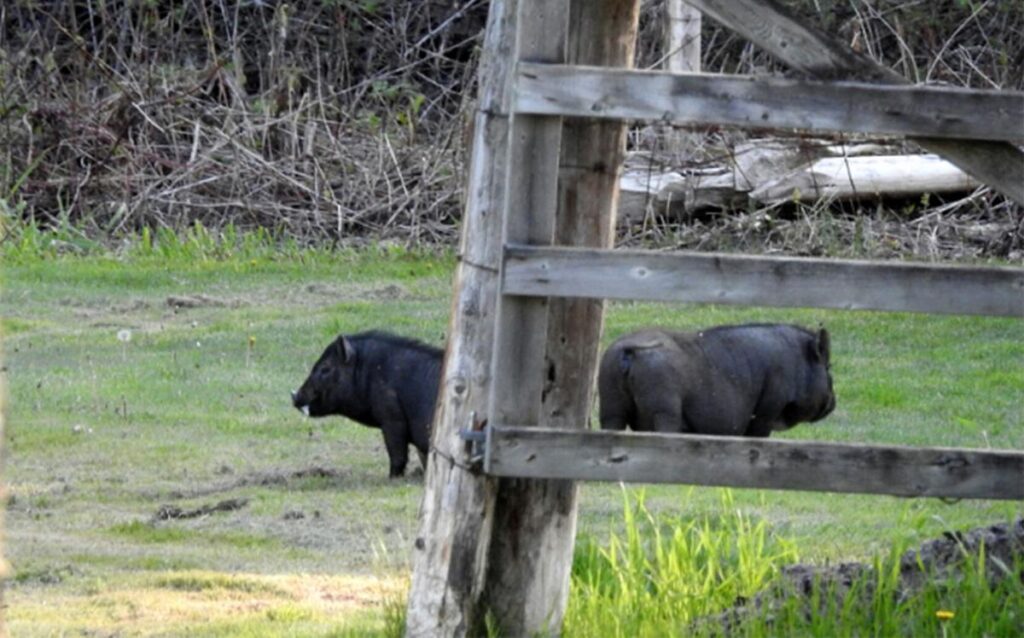Roaming pigs and cattle from a farm in Sterling continue to trample and dig up neighbors’ property, and area legislators have appealed to multiple state agency leaders for action.
State Rep. Doug Dubitsky, R-Norwich, Rep. Anne Dauphinais, R-Killingly, and Sen. Heather Somers, R-18th District, all penned a letter to Department of Agriculture Commissioner Bryan Hurlburt and Department of Energy and Environmental Protection Commissioner Katie Dykes late last month in regards to the loose livestock.
“We write today to ask that you invoke the authority of your respective departments to get involved in a situation in the town of Sterling which, if allowed to progress, could potentially decimate large swaths of natural and agricultural land in Eastern Connecticut,” the letter read.
The legislators’ letter focused on the hogs that have been escaping from the local Radical Roots Farm and concerns that some of the pigs may have become feral. But a resident and First Selectman Link Cooper said Tuesday that roaming cattle from the same farm also are damaging property and posing an even greater danger by crossing the main road through town. Cooper said he is in constant contact with the state agriculture department, but could not comment on what action might be in the works.
“It certainly hasn’t been resolved by any means,” he said. “We have a lot of unhappy people in town.”
The farm’s owner has not responded to requests for comment.
The agriculture department’s animal control unit is investigating “the issue of roaming pigs and cattle in Sterling,” agency spokesperson Rebecca Eddy said Tuesday.
“We cannot comment further at this time on the specifics of the case,” Eddy said via email. “CT (Department of Agriculture) is committed to ensuring the health and welfare of domestic livestock.”
A DEEP spokesperson deferred comments to the agriculture department.
Pine Hill Road resident Scott Levine said wandering hogs have torn up his lawn. He has contacted state police and the regional animal control authority, the Northeastern Connecticut Council of Governments, but has not seen any action to corral the loose livestock.
“It doesn’t seem like he’s going to take any responsibility for his animals,” Levine said of the local farmer. “I don’t think he should have them. I feel for the guy, but he’s completely unresponsive to our needs.”
Michael Grenier, another resident of Pine Hill Road, said roaming hogs have ruined his lawn, which he estimates will cost about $23,000 to replace. Grenier said loose cattle from the same farm are posing an immediate hazard to motorists on Route 14 A. Cooper confirmed that cattle crossed the road on Sunday morning, about a half-mile from the farm where they should be contained. He said one resident had 31 cows on his property recently.
Sterling officials have drafted an ordinance that would impose local fines for roaming livestock. The proposed rules, which will go to a town meeting, are being reviewed by legal counsel, Cooper said.
Since the end of September, pigs in groups as large as about two-dozen animals have furrowed and cratered lawns on several properties. A looming question, however, is whether they are now bearing young outside the farm.
“Local reports indicate some of the hogs… have become feral and are now reproducing feral offspring,” the state legislators wrote to DEEP and agriculture commissioners.
“It was one thing when an isolated farmer allowed his animals to roam. It is another issue entirely when a stock of feral hogs is establishing a foothold in Eastern Connecticut,” they wrote. “We are sure we don’t have to tell either of you what kind of danger a growing team of feral hogs can cause to the natural and agricultural lands of our state. One need only look at the destruction they have wrought in places like Hawaii, Texas and Pennsylvania.”
Feral hogs have wreaked millions of dollars in damage across at least 30 states. The U.S. Department of Agriculture’s latest distribution map, however, shows none of the wild animals in Connecticut, Rhode Island, or Massachusetts. The closest population is in New Hampshire, according to the federal agency.
Radical Roots Farm’s website says they raise livestock for meat without growth hormones, chemical fertilizers, or harmful pesticides. Regarding pigs, the page says the animals “naturally want to roam and root. Allowing them this option reduces their stress. They can forage for greens, roots, grubs, and nuts. Our pigs can snack on hog feed (local, non-GMO) but prefer other food sources, if available. We also feed them produce, and have added brewers grain to their diet, which they love.”
Cooper has said the farmer came to town just over two years ago. Not long thereafter, cows got loose and damaged residential and farm land. Grenier said he was unaware of the previous issues when the hog gangs first invaded his yard. The first time the wayfaring swine damaged his lawn on Sept. 30, Grenier said he spoke to the farmer, who came out and planted grass seed. The pigs returned and Grenier said he called again and the farmer came out again to repair the damaged lawn, he said. The third time, however, the farm owner did not respond to his calls, Grenier said, and the pigs returned every day for about two and a half weeks, plowing up his grass with their rooting snouts.
Source : CT Insider


